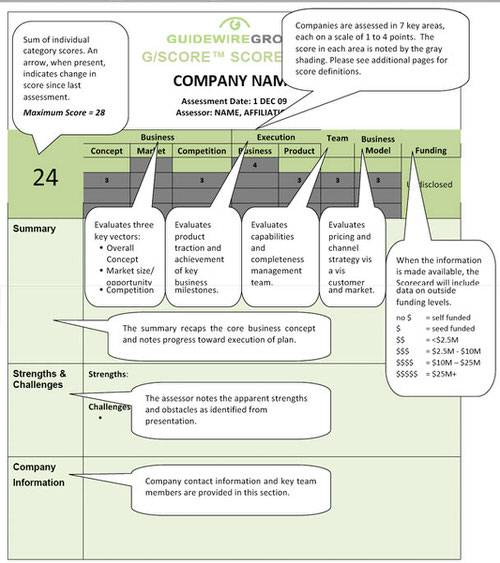The Guidewire Group just launched its Innovate!100 competition to highlight the most promising companies of the year. Early-stage startups are encouraged to submit applications and compete in one of 22 pitch slam events across Europe and North America. Winners will enjoy global visibility and may share in sponsored awards including cash and in-kind prizes, valued at over $1 million dollars. In addition to being an international competition, one of the things that makes this contest different from other events is the fact that shortlisted companies’ assessments will be made public. ReadWriteWeb caught up with former DEMO producer and Guidewire Group President Mike Sigal to find out why he’s sharing his company’s secret sauce through something called the G/Score.

Contrary to popular belief, the G/Score is not a rating of your startup’s street smarts. The score is the Guidewire Group’s attempt to rate your company across a variety of categories and help you improve your prospects. The company’s assessors include VCs, journalists, economic development strategists and executives from companies like Microsoft, Motorola and Research in Motion. Scores are assigned to demystify what investors, media and partners yearn to discover – namely, are you a fit?
Says Sigal, “Investors have a fiduciary duty and it’s not our place to give investment advice. What we’re doing is creating a resource to highlight companies and make them accessible to the greater community… The response from entrepreneurs is that fundamentally, if it means that we’ll save them time by connecting them with the right people, they’re all for it.”
While the top company scores will be made public for the Innovate!100 Program, entrepreneurs who choose to work with Guidewire on subsequent G/Scores have the option to keep their scores private and apply for re-scoring after correcting their weaknesses. Because all pitch slam finalists will be judged using the scorecard, those applying should consider the following questions as they pertain to the Guidewire methodology:
Business
This part of the G/Score is all about the nature of your business idea.
1. Concept: Can you prove a need for your product? Will you create a new market or disrupt existing leaders?
2. Market: Are there enough potential customers to create a compelling business? Will you have to share the market with a lot of other players?
3. Competition: Who else is competing for your market’s attention? (Sigal explains that this isn’t just direct competitors, but indirect competitors, alternatives and even customer indifference or inertia).
Execution
This section is all about reality, not projections. Here you are expected to give a picture of your everyday business.
1. Business: How many users, partners and major stakeholders do you currently have? What is your adoption rate amongst them?
2. Product: Does your product exist or is it just an idea? If it does exist, do you have user adoption? If you were to stop providing a service today, would your customers have noticeably worse lives?
Team
Having a team of famous second-time entrepreneurs is great, but not if you’ve only got engineers. Have you got a well-rounded team of individuals who can fulfill the responsibilities of running a successful business?
Business Model
A revenue stream is not a business model unless it has been proven through a repeatable process. In his own words, Sigal says, “This section is all about the Benjamins. Are you making money and can you continue to make money over time?”
Funding
Are you self-funded, seed funded and/or VC funded from $2.5 million to more than $25 million dollars?

To apply for one of the Innovate!100 Pitch Slam events go to Innovate100.com/program. Registration for the program is $75 dollars USD and includes 2 pitch slam registrations, access to online pitch training and inclusion in the program promotions. European entrepreneurs should start applying now as the first event kicks off in Barcelona on March 1st.

















